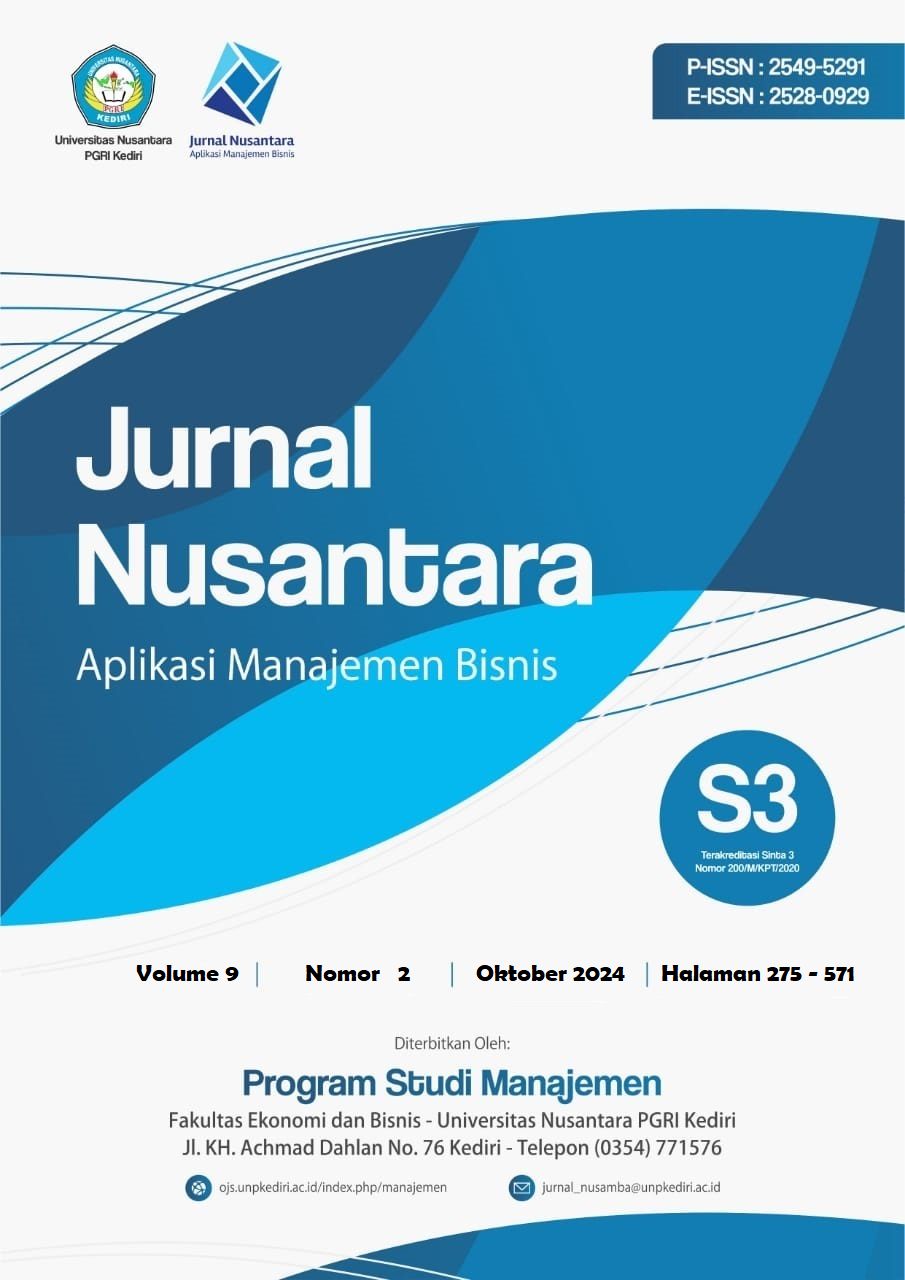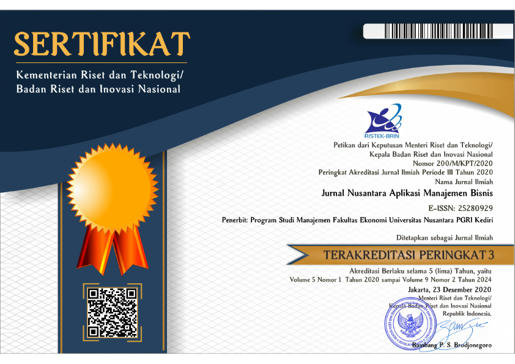Enhancing Graduate Employability Through Soft-Skill Practice In University Malaysia Terengganu
DOI:
https://doi.org/10.29407/nusamba.v9i2.16669Keywords:
Leadership, Communication, Interpersonal, Ethics on employabilityAbstract
Research Aim: This study explores the relationship between leadership, communication, interpersonal, and ethics on the employability of graduates from Universiti Malaysia Terengganu (UMT).
Method: This research applied a quantitative method with 260 respondents from UMT alumni. Data were collected through closed-ended questionnaires and analyzed using the Statistical Package for Social Science (SPSS). Multiple regression analysis was conducted to test the hypotheses.
Research Finding: The results indicate that communication skills and ethics significantly affect the employability of UMT graduates, whereas leadership and interpersonal skills show no significant relationship. Ethics emerged as the most influential variable, with a beta coefficient of 0.826.
Theoretical Contribution/Originality: This study highlights the importance of soft skills, particularly ethics and communication, in enhancing the employability of UMT graduates. It supports the literature that technical skills alone are insufficient to determine employability; they must be combined with soft skills.
Practitioner/Policy Implication: The findings suggest educational policy implications, where universities should focus on developing students' soft skills, particularly ethics and communication, to improve graduate employability. Leadership and interpersonal skills development programs could also be enhanced.
Research Limitation: This study is limited to UMT alumni and utilizes only quantitative data. Future research should involve other universities and consider qualitative approaches to gain deeper insights into other factors influencing employability.
Downloads
References
Aprileani AP, Abadi F. The Roles of Transformational Leadership on Employee’s Job Satisfaction, Readiness for Change, and Organizational Commitment of Islamic Banking in Indonesia. Indones J Bus Anal 2022;2:213–30.
Tentama F, Subardjo S, Merdiaty N, Asti Mulasari S. The effect of interpersonal communication and self-adjustment to the work readiness of vocational high school students. Int J Res Stud Educ 2019;8:29–38. https://doi.org/10.5861/ijrse.2019.4004.
Marina A, Wahjono SI, Kurnoawati T. Penerapan Sistem Informasi Akuntansi Syariah untuk Mematuhi Etika Bisnis Rumah Sakit Jurnal Nusantara Aplikasi Manajemen Bisnis Vol . X No. X Tahun XXXX. J Nusant Apl Manaj Bisnis 2021;6:109–17. https://doi.org/10.29407/nusamba.v6i1.15747.
Asmahani N, Suhana. Peningkatan Kesiapan Kerja Lulusan melalui Softskill. J Mirai Manag 2022;7:339–47.
Audibert, G. and Jones, M. (2002). The Softer Side. Advisor Today,97(2), 72. Proquest database
Bass, B. 1990. Bass & Stogdill's Handbook of Leadership: Theory Research and managerial applications (3rd ed.). Free Press, New York, NY.
C. E. Hmelo-Silver, Problem-based learning: What and how do students learn? Educational Psycho. Rev., 16, (2004), 235–266.
Cohen, S. & Bailey, D. (1997). What makes teams work: Group effectiveness research from the shop floor to the executive suite. Journal of Management, 23(3), 239-290.
Gibb, A. (1999), “Can we build effective entrepreneurship through management development”, Journal of General Management, Vol. 24 No. 4, pp. 1‐21
Jones, E. (1994). Essential Skills In Writing, Speech, Listening, And Critical Thinking For College Graduates: Perspectives Of Faculty, Employers, And Policymakers. National Centre On Postsecondary Teaching, Learning, And AssessmentPolit D. Beck C (2006) Essentials of Nursing Care: Methods, Appraisal and Utilization. 6th ed. Lippincott Williams and Wilkins, Philadelphia
Mosadegh Rad, A. M., & Yarmohammadian, M. H. 2006. A study of the relationship between managers’ leadership style and employees’ job satisfaction. Leadership in Health Services, Vol. 19, No. 2, pp. xi-xxviiiParahoo K (2006) Nursing Research: Principles, Process and Issties. 2nd ed.Palgrave Macmillan. Houndmills Basingstoke
Morris, H.M., Donald, K.F. and Minet, S. (2001), “Towards integration: understanding entrepreneurship through frameworks,” Entrepreneurship and Innovation, February, pp. 35‐49.
Nurita, Shaharudin and Ainon (2004). A survey of students’ employability skills: A case of Unitar.
Nurita, Shaharudin and Ainon (2004). Perceived employability skills of graduating students: Implications for SMEs.
Sufian. (1992). What do employers expect from high school graduates? NASSP Bulletin, 66, 93-98.
Forijati R, Meilina R, Muzaki MN, Hastuti SW. Influence of Personal Knowledge, Technology and Communications on Knowledge Management of Small and Medium Enterprises. Int J Res Rev 2022;9:334–43. https://doi.org/10.52403/ijrr.20221040.
Downloads
Published
Issue
Section
License
Authors who publish with this journal agree to the following terms:
- Copyright on any article is retained by the author(s).
- The author grants the journal, the right of first publication with the work simultaneously licensed under a Creative Commons Attribution License that allows others to share the work with an acknowledgment of the work’s authorship and initial publication in this journal.
- Authors are able to enter into separate, additional contractual arrangements for the non-exclusive distribution of the journal’s published version of the work (e.g., post it to an institutional repository or publish it in a book), with an acknowledgment of its initial publication in this journal.
- Authors are permitted and encouraged to post their work online (e.g., in institutional repositories or on their website) prior to and during the submission process, as it can lead to productive exchanges, as well as earlier and greater citation of published work.
- The article and any associated published material is distributed under the Creative Commons Attribution-ShareAlike 4.0 International License












